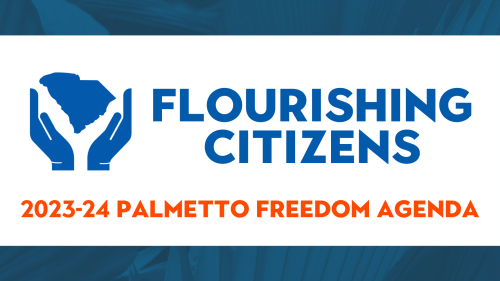Flourishing Citizens: 2023-24 Freedom Agenda in Review
Now that the General Assembly has adjourned sine die, we are taking a look back at the 23 policies Palmetto Promise proposed in the 2023-24 Palmetto Freedom Agenda at the beginning of the legislative session. Did our Freedom Agenda policies make it into law? Or, at the very least, did they start a conversation that future General Assemblies can act upon?
Today, we look at the five policies proposed under our Flourishing Citizens category.
As a reminder, each policy is marked with one of four symbols to match its status ✅ = signed into law, 📝= conference committee report pending, ⌛ = passed one chamber but fell short, ❌ = no movement.
Let’s take a look at these quality of life policies!
12. Move to Criminal Asset Forfeiture ❌
In South Carolina, as in most states, law enforcement may seize a person’s assets temporarily if there is a suspicion that those assets were involved in criminal activity. However, in practice, the seizure is anything but temporary. Because our current law is based on civil forfeiture, a citizen may never see their cash or their car again—even if they are never found guilty of a crime. That’s when seizure becomes forfeiture. Palmetto Promise Institute has long advocated for a criminal asset forfeiture system, which means that a crime must be committed for a citizen to lose his or her assets permanently. After the SC Supreme Court ruled in late 2022 that only the General Assembly could change this rule—not the Court—a few bills were introduced in 2023-24, but none of the bills achieved enough behind the scenes traction to earn a hearing in either the Senate or the House. Perhaps the General Assembly is unaware that over 3 years a whopping $17 million in assets were seized. We are hopeful that 2025 will see a restart to this debate so that for law-abiding citizens, the basic constitutional right to property is protected.
13. Incent Housing Supply ❌
The construction of homes and the development of subdivisions should be a market-driven, free enterprise activity. The market should determine the price of a home and where houses are built. But because of South Carolina’s low average household income and high “in-migration” (people moving here) there is a shortage of affordable homes. Government shouldn’t be in the housing business, but there are policies that can provide incentives for a larger supply of housing. The 2023-24 legislature inched forward by passing S.739 and S.284 to provide one-time tax credits for housing development, but there are better and more local free market alternatives, like the American Enterprise Institute’s “light touch density” policies.
14. Reform Occupational Licensing ✅
South Carolina’s occupational licensing system seems to be based on the notion that every job should require some kind of license. This policy means that too many willing workers face unnecessary barriers to employment. Fortunately, Senators Tom Davis and Wes Climer are fully committed to rolling back licensing where it makes no sense. Among the successes in 2023-24 were H.3278 (easing licensing requirements for real estate appraisers), S. 862 (childcare caregiver licensing), and H.5183 (certified medical assistant licensing). A couple of outstanding occupational licensing bills passed only one chamber…top priorities for 2025!
15. Ban ESG (Environmental, Social, Governance) ✅
The politicization of financial markets these days seems to know no bounds. In the recent past, businesses and the financial entities that invest in them had one goal: making money for their clients. Now, businesses are being forced to meet political goals and woke asset managers are directing capital to corporations that agree to eschew carbon and promote DEI. It’s not hard to see the dangers of such a system. The 2023-24 legislature pushed back against this nonsense with H.3690, an artfully drawn bill that makes it clear that state funds must be invested with a singular goal: maximizing return.
16. Open Electricity Markets 📝
There is no blinking at the fact that South Carolina is facing an energy crisis. The current generation capacity of the Investor-Owned Utilities (IOUs) combined with state-owned Santee Cooper is struggling to keep up with rising industrial, retail, and residential demand on the electricity grid in the Palmetto State. Palmetto Promise has offered a “spectrum of reform,” a wide range of options for solving this crisis. The House proposed an energy bill that centered on the construction of new natural gas generation. The Senate countered with a short resolution calling for an expanded conversation about energy before jumping on board with specific policies. With the parties that far apart, the Conference Committee will no doubt struggle to find a way forward. Gas is good, but it could be time to open a discussion about SMRs (small modular nuclear reactors). Here’s an interesting fact on small nuclear reactors: the United States deploys 49 nuclear attack submarines. We hope to see further discussion on energy freedom in the 2025-26 legislative session.
See how all our Freedom Agenda policies fared this legislative session in our summary post, and make sure you read our blog every day this week as we release one post per day summarizing the status of our Freedom Agenda policies. So far, we have reviewed the policies in our Educated Citizens and Healthy Citizens categories – give them a read!






